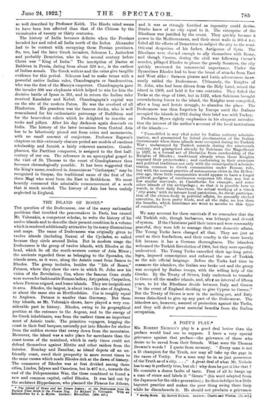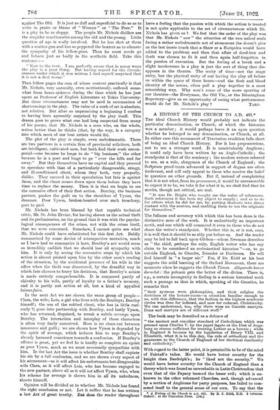A POET'S PLAY.*
Ma. ROBERT Nrcnors's play is a good deal better than the preface would lead one to suppose. I have a very special grievance against that preface—the grievance of those who desire to be saved from their friends. What were Sir Thomas Browne's words ? I quote from memory. " Every man is not a fit champion for the Truth, nor may all take up the gage in the cause of Verity. For a man may be in as just possession of the Truth as of a city. . . ." A great deal of what Mr. Nichols has to say is perfectly true, but oh ! why does he put it like that ? He commits a dozen faults of taste. First of all he hangs up a man of straw and labels it " Genro " (his word adapted from the Japanese for the older generation) ; he then indulges in a little bayonet practice and makes the poor thing swing there linip while he disembowels it. He should not proclaim a grievance • Guilty Soule. By Robert Nichols. London Chatto and WIndue. [7s. net.]
against The Old. It is just as dull and superficial to do so as to write in praise or blame of " Woman " or " The Poor." It is a pity to be so sloppy. The people Mr. Nichols dislikes are the stupider reactionaries among the old and the young. Little question of ago is really involved. But he has shot at them with a scatter-gun and has so peppered the beaters as to alienate the sympathy of his fellow-guns. Then he must needs go and behave just as badly in the aesthetic field. Take this sentence :-
" Now to the text. I am perfectly aware that in many ways the play is a poor thing. But having regard for the circum- stances under which it was written I. fmd myself surprised that it is not a deal worse."
Then follow pages the sum of whose content practically is that Mr. Nichols, very naturally, even meritoriously, suffered some- what from home-sickness during the time which he has just spent as Professor of English Literature at Toldo University. But these circumstances may not be used in extenuation of shortcomings in the play. The value of a work of art is absolute, not relative. But after so unpromising a. beginning I confess: to having been agreeably surprised by the play itself. This drama goes to prove what one had long suspected from many of his poems, that Mr. Nichols is a man who, on the whole, writes better than he thinks (that, by the way, is a category into which most of our best artists would fit).
The plot of the play is simple, even melodramatic. There are two partners in a certain firm of provincial solicitors, both are intelligent, cultivated men, but both find their work uncon- genial—one because he longs to do " big business," the other because he is a poet and longs to go " over the hills and far away." But they themselves have no capital and they proceed
to speculate with that of a particularly disagreeable, stingy, and ill-conditioned client, whom they both, very properly,
dislike. They succeed in their speculation but fate is against them, and the client comes down upon them before they have time to replace the money. Then it is: that we begin to see the corrosive effect of their first action. Bentley, the business partner, pushes the guilt on to the shoulders of Vyson, the dreamer. Poor Vyson, broken-hearted over such treachery, goes to gaol.
Mr. Nichols has been blamed by that capable technical critic, Mr. St. John Ervine, for having shown us the actual theft and its preliminaries, on the ground that it was with the psycho- logical consequences of the orime, not with the crime itself, that we were concerned. Somehow, I cannot quite see what Mr. Nichols could. have substituted for this first Act. Baldly summarized by some device of retrospective narrative, much as I have had to summarize it here, Bentley's act would seem so incredibly caddish that we should lose all sympathy with him. It is only by seeing the successive steps by which his action is almost pushed upon him by the other men's reading of the situation, by the accidental presence of his wife in the office when the theft was discovered, by the dreadful way in which fate chooses to hurry his decisions, that Bentley's action is made entirely comprehensible. It is composed partly of chivalry to his wife, partly of loyalty to a father's memory, and it is partly not action at all, but. a. kind of appalled laissez-faire.
In the next Act we are shown the same group of people—
Clara, the wife; Lois, a girl who lives with the Bentleys; Bentley himself ; the son of the robbed client, who has (a little curi- ously ?) gone into partnership with Bentley, and lastly Vyson, who has returned, disguised, to wreak a subtle revenge upon Bentley. The interaction and interplay of these characters is often very finely conceived. Here is no clean-cut between innocence and guilt ; we are shown how Vyson is degraded by the spirit of revenge, which induces him to urge Bentley's already harassed conscience towards a confession. If Bentley's offence is great, yet we feel he is hardly so complete an egoist as poor Vyson, much as we must necessarily sympathize with.
him. In the last Act the issue is whether Bentley shall expiate his sin by a full confession, and we are shown every aspect of his atonement—as it will affect his unfortunate but disagreeable wife Clara, as it will affect Lois, who has become engaged to the new partner, above all as it will not affect Vyson, who, when
his scheme for revenge is shown him in all its nakedness, shoots himself.
Opinion will be divided as to whether lifis Nichols has found the right conclusion or not. Let it suffice that he has written a last Act of great tensity. But does the reader throughout
have a feeling that the passion with which the action is treated is not quite applicable to the set of circumstances which Mr. Nichols has given us ? We feel that the order of the play was that Mr. Nichols " saw " the situation of the two naked souls facing a rather melodramatic act of atonement (he doesn't give us the last ironic) touch that a Shaw or a Euripides would have added to the problem) and then that affair of deed-box and theft was chosen to fit it and then again half-forgotten in the passion of execution. But the feeling of a break and a slight incoherence in a play is just the sort of thing that dis- appears in the theatre. The unity of time—not the stage unity, but the physical unity of our having the play all before, us within the space of three hours—and the flesh and blood identity of the actors; often pull a play together in a most astonishing way. Why won't some of the more sporting of our theatres—the Everyman, the Old Vie., or the Birmingham Repertory—give us an opportunity of seeing what performance
would do for Mr. Nichols's play ? TARN.



































 Previous page
Previous page